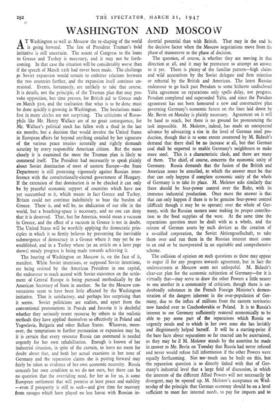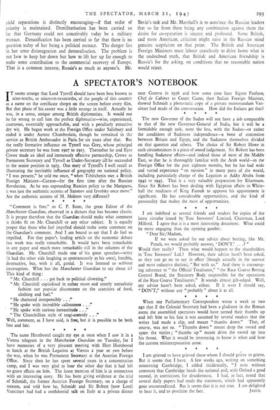WASHINGTON AND MOSCOW
AT Washington as well as Moscow the re-shaping of the world is going forward. The fate of President Truman's bold initiative is still uncertain. The assent of Congress to the loans to Greece and Turkey is necessary, and it may not be forth- coming. In that case the situation will be considerably worse than if the speech of March 12th had never been made. The challenge io Soviet expansion would remain to embitter relations between the two countries further, and the expansion itself continue =- resisted. Events, fortunately, are unlikely to take that course. It is details, not the principle, of the Truman plan that may pro- voke opposition, but time presses, for British aid to Greece ends on March 31st, and the realisation that what is to be done must be done quickly is growing in Washington. The hesitations mani- fest in many circles are not surprising. The criticisms of Russo- phils like Mr. Henry Wallace are of no great consequence, for Mr. Wallace's political stock has fallen with a thud in the last six months, but a decision that would involve the United States in European affairs far beyond anything entailed• by her signature of the various peace treaties naturally and rightly demands scrutiny by every responsible American citizen. But the more closely it is examined the more the Truman plan is likely to commend itself. The President had necessarily to speak plainly about Soviet domination of most of eastern Europe—the State Department is still protesting vigorously against Russian inter- ference with the constitutionally-elected government of Hungary. If the extension of that domination is to be checked it can only be by peaceful economic support of countries which have not yet succumbed to it, which means in fact Greece and Turkey. Britain could not continue indefinitely to bear the burden of Greece. There is, and will be, no abdication of our role in the world, but a breathing-space is necessary, and no one can deny that it is deserved. That, but for America, would mean a vacuum in Greece, and the effect of a vacuum in Greece is not in doubt. The United States will be worthily applying the democratic prin- ciples in which it so firmly believes by preventing the inevitable submergence of democracy in a Greece where it may yet be re- established, and in a Turkey where (as an article on a later page shows) steady progress is being made towards achieving it.
The bearing of Washington on Moscow is, on the face of it, manifest. While Soviet intentions, or supposed Soviet intentions, are being resisted by the American President in one capital, the endeavour to reach accord with Soviet statesmen on the settle- ment of Central Europe is being pursued methodically by the American Secretary of State in another. So far the Moscow con- versations seem to have been little affected by the Washington initiative. That is satisfactory, and perhaps less surprising than it seems. Soviet politicians are realists, and apart from the conventional protestations in Pravda and Izvestia it is doubtful whether they seriously resent recourse by others to the realistic methods they have applied themselves so effectively in Poland and Yugoslavia, Bulgaria and other Balkan States. Whatever, more- over, the temptations to further permeation or expansion may be, it is certain that every resource Russia can command is needed urgently for her own rehabilitation. Enough is known of her industrial situation, in spite of the curtain, to leave no room for doubt about that, and both her actual exactions in her zone of Germany and the reparation claims she is putting forward may fairly be taken as evidence of her own economic necessity. Russia conceals her own condition as we do not ours, but there can be no question that the overriding need, for her as for us, is some European settlement that will promise at least peace and stability —even if prosperity is still to seek—and give time for recovery from ravages which have played no less havoc with Russian in- dustrial potential than with British. That may in the end be the decisive factor when the Moscow negotiations move from the phase of manoeuvre to the phase of decision.
The question, of course, is whether they are moving in that direction at all, and it may be premature to attempt an answer to it yet. There is plenty of the familiar pattern—high claims and wild accusations by the Soviet delegate and firm rejection or rebuttal by the British and American. The latest Russian endeavour to go back past Potsdam to some hitherto undisclosed Yalta agreement on reparations only spells delay, not progress. Potsdam completed and superseded Yalta, and since the Potsdam agreement has not been honoured a new and constructive plan governing Germany's economic future on the lines laid down by Mr. Bevin on Monday is plainly necessary. Agreement on it will be hard to reach, but there is no ground for pronouncing the task impossible. M. Molotov, indeed, has made an unexpected advance by advocating a rise in the level of German steel pro- duction, though that is to some extent countered by M. Bidault's demand that there shall be no increase at all, but that German coal shall be exported to enable Germany's neighbours to make more steel. This is a characteristic dash; and there are many of them. The chief, of course, concerns the economic unity of Germany. Russia demands that the fusion of the British and American zones be annulled, to which the answer must be that that can only happen if complete economic unity of the whole of Germany is to take its place. M. Molotov asks similarly that there should be four-power control over the Ruhr, with its immense industrial production. Once more the answer is that that can only happen if there is to be genuine four-power control (difficult though it may be to operate) over the whole of Ger- many, with the Russian eastern zone making its proper contribu- tion to the -food supplies of the west. At the same time the reparations question must be dealt with as a whole, and the seizure of German assets by such devices as the creation of a so-called corporation, the Soviet Aktiengesellschaft, to take them over -and run them in the Russian interest must come to an end or be incorporated in an equitable and comprehensive scheme.
The collision of opinion on such questions as these may appear to augur ill for any progress towards agreement, but in fact the undercurrents at Moscow seem not unhopeful. M. Bidault's clear-cut plan for the economic subjection of Germany—for it is virtually that—may serve to draw the other Powers a little nearer to one another in a community of criticism, though there is un- doubtedly substance in the French Foreign Minister's demon- stration of the dangers inherent in the over-population of Ger- many, due to the influx of millions from the eastern territories now handed over to Czechollovakia or Poland. It is to Russia's interest to see Germany sufficiently restored economically to be able to pay some part of the reparations which Russia so urgently needs and to which in her own zone she has lavishly and illegitimately helped herself. It will be a starting-point if the bare facts about reparations so far exacted can be ascertained, as they may be if M. Molotov stands by the assertion he made in answer to Mr. Bevin on Tuesday that Russia had never refused and never would refuse full information if the other Powers were equally forthcoming. Not txx much can be built on this, but the reparation question is so directly linked with that of Ger- many's industrial level that a large field of discussion, in which the interests of the different Allied Powers will not necessarily divergent, may be opened up. M. Molotov's acceptance on Wed- nesday of the principle that German economy should be on a level sufficient to meet her internal needs, to pay for imports and to yield reparations is distinctly encouraging—if that order of priority is maintained. Demilitarisation has been carried so far that Germany could not conceivably today be a military menace. Denazification has been carried so far that there is no question today of her being a political menace. The danger lies in her utter disintegration and demoralisation. The problem is not how to keep her down but how to lift her up far enough to make some contribution to the commercial recovery of Europe. That is a common interest, Russia's as much as anyone's. Mr. Bevin's task and Mr. Marshall's is to convince the Russian leaders that so far from there being any combination against them the desire for co-operation is sincere and profound. Some British, and more American, criticism might raise in the Russian mind genuine scepticism on that point. The British and American Foreign Ministers must labour ceaselessly to drive home what is the undoubted truth, that British and American friendship is Russia's for the asking, on conditions that no reasonable nation would reject.



































 Previous page
Previous page